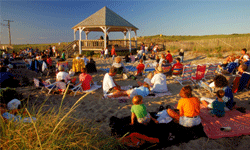When you're looking for an event that's a real crowd-pleaser, it's tough to go wrong with music. It spans cultures, ages and tastes, and you've got a lot of options in terms of event size, style and budget.
Basically, if you've got a crowd, or you hope to, music is a pretty sure bet.
Advertisement
Not that it's the easiest type of event to coordinate. A concert can come with multiple elements to coordinate and endless possibilities to plan ahead for. But with some research, forethought and attention to detail, anyone can pull it off.
Some of the bigger considerations, such as budget, and getting one or more musicians to show up, are fairly obvious. But there are other factors -- important ones -- that people sometimes overlook. Here, 10 tips to help you put together a great show from inception to encore, starting with the most important thing to keep in mind when planning this type of event: These things take time, and often lots of it, to get it right.






